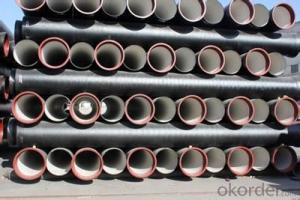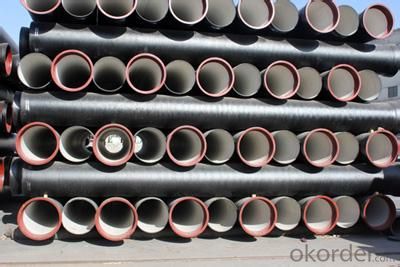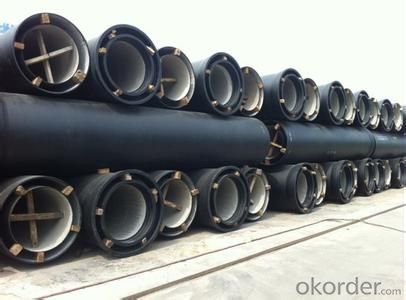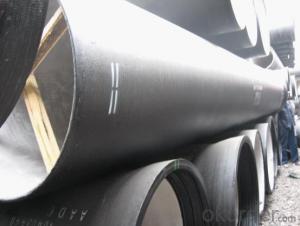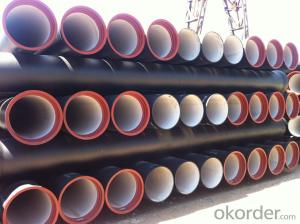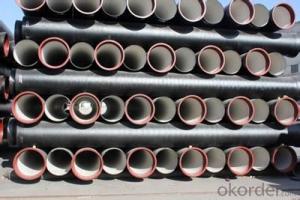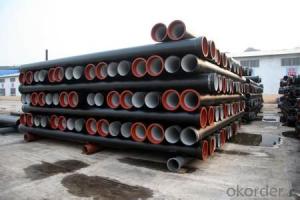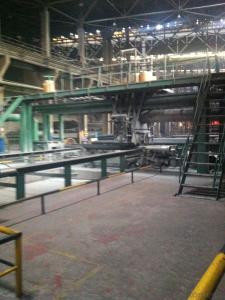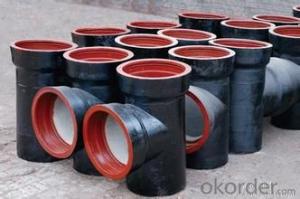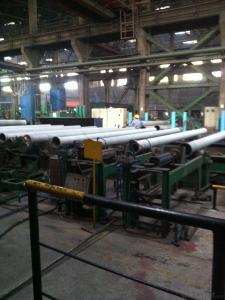DUCTILE IRON PIPE AND PIPE FITTINGS K9 CLASS DN80
- Loading Port:
- Tianjin
- Payment Terms:
- TT OR LC
- Min Order Qty:
- 20 pc
- Supply Capability:
- 3000 pc/month
OKorder Service Pledge
OKorder Financial Service
You Might Also Like
Material : Ductile Cast Iron
Size Range : DN 80mm to DN 2000mm
Unit Effective Length : 6m or 5.7m
Manufacture Standard: ISO 2531:1998/ EN 545:2006/EN 598:2007
Annual capacity : 200,000 tons
Coating Exterior: Zinc 130g/m2 according to ISO 8179-1 and bitumen coating 70 microns.
Cement Interior: Portland Cement/ High Alumina Cement/ Sulphate Resisting Cement Lining according to ISO 4179
Special requirements on external coating and internal lining can be applied
We also provide accessories such as SBR/EPDM rubber gaskets, lubricant paste, pipe caps, PE sleeves, etc.
Additional Parts:
Each pipe is strictly inspected according to related standard to ensure permanently high performance.
Easy Installation at site and service free for life
Long Service Lifespan
Quotation will arrive you within 24hours once we get your inquiry.
We guarantee offering you a competitive price.
A copy of original inspection reports of pipes will be offered after shipment.
Photos of loading process will be sent to the customer after shipment effect.
We will follow-up the delivery progress after shipment effect and update to the customer on weekly basis.
- Q: The difference between ductile iron pipe and UPVC drain pipe
- UPVC tube or rigid polyvinyl chloride pipe, U-PVC pipe, is a kind of strong corrosion resistance, acid and alkali salt oil medium erosion, light quality, has certain mechanical strength, good hydraulic conditions, convenient installation, but easy to aging, high temperature resistant, but can not withstand the impact, applied to the domestic water system, DN50 pipe connection DN65, using a ring connected with the above.
- Q: What is the expected joint tightness for ductile iron pipes?
- The expected joint tightness for ductile iron pipes is typically high due to the robustness of the material and the quality of the jointing methods used, such as rubber gaskets or mechanical couplings. This ensures a reliable and leak-free performance in various applications.
- Q: Method for joining cast iron pipes
- The connection between the pipe and the pipe adopts the form of socket type or flange disk interface. According to the function, it can be divided into two kinds: flexible interface and rigid interface. The flexible interface is sealed with rubber ring, which allows a certain degree of corner and displacement, so it has good seismic resistance and tightness. It is easy and quick to install than rigid interface. It has little labor intensity according to the casting method.
- Q: Can ductile iron pipes be used for underground parking lot drainage?
- Ductile iron pipes are indeed suitable for drainage in underground parking lots. This robust material is frequently utilized in underground piping systems due to its strength and durability. It exhibits exceptional resistance to corrosion, making it an ideal choice for situations where the pipes will come into contact with moisture and water. Furthermore, ductile iron pipes possess considerable tensile strength, enabling them to bear heavy loads and endure the pressure exerted by vehicles in a parking lot. Consequently, opting for ductile iron pipes for underground parking lot drainage ensures a dependable and enduring solution.
- Q: How do ductile iron pipes perform in extreme weather conditions?
- Ductile iron pipes are renowned for their outstanding performance when faced with harsh weather conditions. Crafted from an iron alloy infused with small quantities of carbon and other elements, these pipes exhibit unparalleled strength and resilience, rendering them highly impervious to the effects of extreme weather. In soaring temperatures, ductile iron pipes maintain their structural integrity without succumbing to softening or deformation, unlike certain other materials. This ensures that the pipes continue to function optimally and reliably, even in scorching heat. Furthermore, these pipes boast a remarkable resistance to thermal expansion, thereby minimizing the risk of pipe distortion or joint failure during temperature fluctuations. When confronted with frigid conditions, ductile iron pipes also excel. They possess a low coefficient of thermal expansion, translating to a reduced likelihood of cracking or fracturing due to freezing temperatures. Moreover, their robustness and flexibility enable them to withstand the pressure exerted by freezing water inside the pipes without incurring significant damage. In addition, ductile iron pipes exhibit superb corrosion resistance, demonstrating their ability to withstand the detrimental effects of harsh chemicals, saltwater, and other corrosive substances that may be present in extreme weather conditions. This corrosion resistance ensures the longevity and dependability of the pipes, preventing leaks and preserving water quality. In terms of durability, ductile iron pipes are designed to endure heavy loads and external stresses. Boasting high tensile strength, they display resistance to bending and breakage. This characteristic proves crucial in extreme weather conditions where heavy rainfall, powerful winds, or even seismic activities may occur. All in all, ductile iron pipes have a well-established reputation for delivering exceptional performance in extreme weather conditions. Their strength, resilience, thermal stability, corrosion resistance, and durability render them a reliable choice for a multitude of applications, including water supply, sewage systems, and industrial pipelines, even in the most challenging weather environments.
- Q: What is the expected external coating for ductile iron pipes?
- The expected external coating for ductile iron pipes is typically a protective layer of asphaltic or polyethylene coating.
- Q: What are the different joint types available for ductile iron pipe?
- Ductile iron pipes offer a range of joint types, each with its own benefits and uses. The most commonly employed joint types in ductile iron pipe installations include: 1. Push-on Joint: This type involves inserting a rubber gasket into a groove on the pipe's spigot end. The pipe is then pushed into the bell end of the adjacent pipe, creating a watertight seal. Push-on joints are known for their quick and easy installation, making them perfect for applications that require efficiency. 2. Mechanical Joint: This joint relies on a gland and follower gasket, which are compressed between the spigot end of one pipe and the bell end of another. Bolts and nuts are used to secure the joint, ensuring a tight and secure connection. Mechanical joints provide excellent integrity and are used in applications with higher pressures or heavy loads. 3. Flanged Joint: Flanged joints utilize flanges on the pipe ends, which are bolted together with gaskets to achieve a leak-proof connection. These joints are commonly employed in situations where pipes need to be easily disconnected and reconnected, such as pump stations or valve connections. 4. Restrained Joint: These joints are specifically designed to prevent pipes from separating under high internal pressures or external forces. They typically incorporate mechanical joints with additional restraining devices like harnesses, rods, or thrust blocks. Restrained joints are commonly used in applications where pipe movement poses a risk or stability is crucial. It is important to consider factors like the application, operating conditions, and project requirements when selecting a joint type. Consulting a professional engineer or pipe manufacturer is advisable to ensure the most suitable joint type is chosen for a specific ductile iron pipe installation.
- Q: What are the different sizes available for ductile iron pipes?
- Ductile iron pipes, also called DI pipes, come in a wide array of sizes to accommodate different needs and applications. The diameter of ductile iron pipes usually ranges from DN 80 (3 inches) to DN 2600 (104 inches), with varying wall thicknesses. For smaller diameters like DN 80 to DN 300, standard lengths of 5.5 meters or 6 meters are readily available for ductile iron pipes. As the diameter increases, the standard lengths may also increase, going up to 7 meters or even longer for larger sizes. Commonly used ductile iron pipe sizes include DN 80, DN 100, DN 150, DN 200, DN 250, DN 300, DN 350, DN 400, DN 450, DN 500, DN 600, DN 700, DN 800, DN 900, DN 1000, DN 1200, DN 1400, DN 1600, DN 1800, DN 2000, DN 2200, DN 2400, DN 2600, and more. It is important to note that the availability of different sizes may vary depending on the manufacturer and the specific region or country. Moreover, custom sizes can also be produced to meet specific project requirements. When selecting the appropriate ductile iron pipe size, it is crucial to consider factors like flow rate, pressure, and intended application to ensure optimal performance and durability. Seeking advice from industry experts or referring to relevant standards and guidelines can aid in determining the suitable size for a particular project.
- Q: Can ductile iron pipes be used for underground river crossings?
- Underground river crossings can indeed utilize ductile iron pipes. Renowned for their robustness and longevity, ductile iron pipes are highly versatile, making them ideal for a range of applications, including underground river crossings. These pipes possess exceptional tensile strength, enabling them to withstand the external forces and pressures imposed by the surrounding soil and water. Moreover, their outstanding resistance to corrosion is paramount when dealing with subterranean water sources like rivers. Additionally, ductile iron pipes can endure ground movements, settling, and any geological obstacles that may arise during the installation and operation of underground river crossings. Consequently, they represent a dependable choice, ensuring the secure and efficient conveyance of water across rivers while preserving the integrity of the subterranean infrastructure.
- Q: What is the difference between cast iron pipe and seamless steel pipe and galvanized steel pipe?
- Seamless steel pipe: a pipe with a hollow cross section, used as a conduit for transporting fluids, such as pipelines for transporting petroleum, natural gas, gas, water, and certain solid materials. Compared withsteel and roundsteelinsolid, flexural torsional strength in the same time, the weight is light, is a kind of economic section steel, widely used in the manufacture of structural parts and mechanical parts, such as the oil pipe, automobile transmission shaft, the bicycle frame and steel construction with scaffold with steel pipe manufacturing ring parts can be improved the utilization rate of materials, simplify the manufacturing process, material saving and working hours, has been widely used to manufacture steel tube.
Send your message to us
DUCTILE IRON PIPE AND PIPE FITTINGS K9 CLASS DN80
- Loading Port:
- Tianjin
- Payment Terms:
- TT OR LC
- Min Order Qty:
- 20 pc
- Supply Capability:
- 3000 pc/month
OKorder Service Pledge
OKorder Financial Service
Similar products
Hot products
Hot Searches
Related keywords
